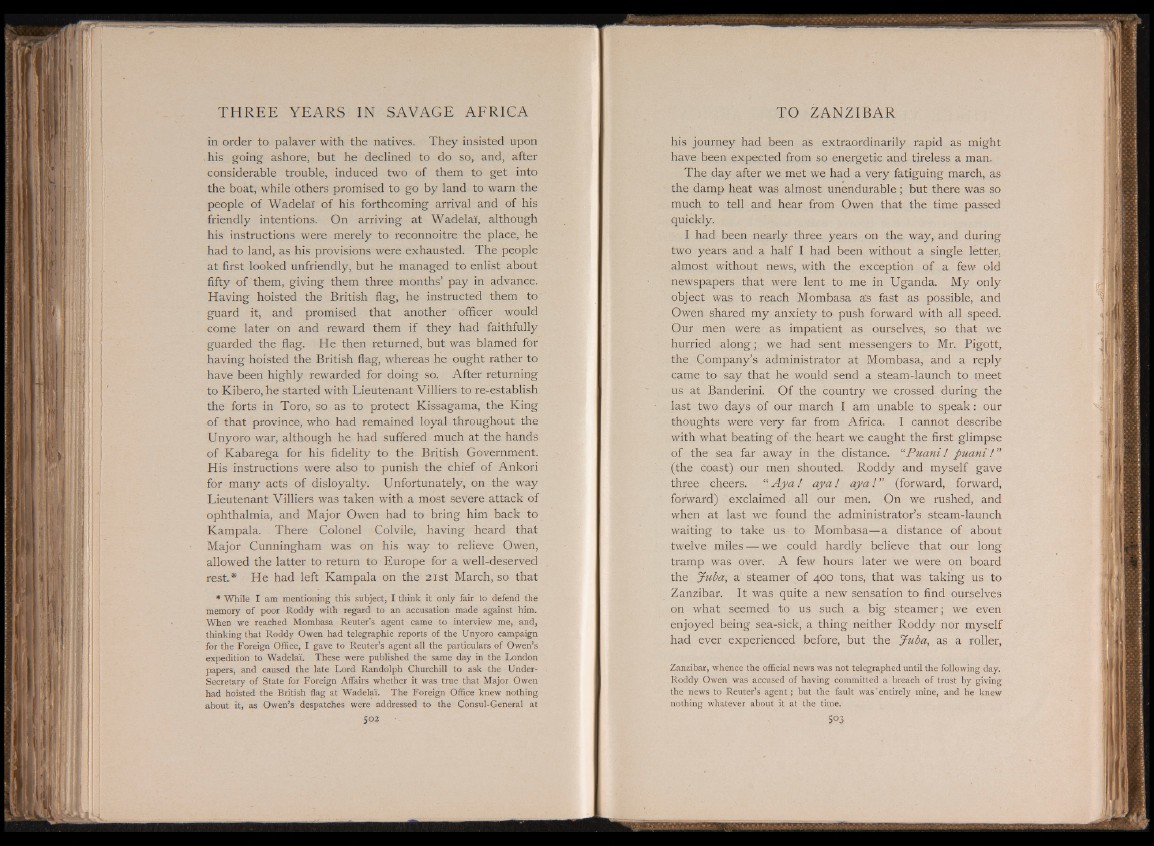
in order to palaver with the natives. They insisted upon
his going ashore, but he declined to do so, and, after
considerable trouble, induced two of them to get into
the boat, while others promised to go by land to warn the
people of Wadela'i of his forthcoming arrival and of his
friendly intentions. On arriving at Wadelal', although
his instructions were merely to reconnoitre the place, he
had to land, as his provisions were exhausted. The people
at first looked unfriendly, but he managed to enlist about
fifty of them, giving them three months’ pay in advance.
Having hoisted the British flag, he instructed them to'
guard it, and promised that another officer would
come later on and reward them if they had faithfully
guarded the flag. He then returned, but was blamed for
having hoisted the British flag, whereas he ought rather to
have been highly rewarded for doing so. After returning
to Kibero, he started with Lieutenant Villiers to re-establish
the forts in Toro, so as to protect Kissagama, the King
of that province, who had remained loyal throughout the
Unyoro war, although he had suffered much at the hands
of Kabarega for his fidelity to the British Government.
His instructions were also to punish the chief of Ankori
for many acts of disloyalty. Unfortunately, on the way
Lieutenant Villiers was taken with a most severe attack of
ophthalmia, and Major Owen had to bring him back to
Kampala. There Colonel Colvile, having heard that
Major Cunningham was on his way to relieve Owen,
allowed the latter to return to Europe for a well-deserved
rest.* He had left Kampala on the 21st March, so that
* While I am mentioning this subject, I think it only fair to defend the
memory of poor Roddy with regard to an accusation made against him.
When we reached Mombasa Reuter’s agent came to interview me, and,
thinking that Roddy Owen had telegraphic reports of the Unyoro campaign
for the Foreign Office, I gave to Reuter’s agent all the particulars of Owen’s
expedition to Wadela'i. These were published the same day in the London
papers, and caused the late Lord Randolph Churchill to ask the Undersecretary
of State for Foreign Affairs whether it was true that Major Owen
had hoisted the British flag at Wadela'i. The Foreign Office knew nothing
about it, as Owen’s despatches were addressed to the Consul-General at
502
his journey had been as extraordinarily rapid as might
have been expected from so energetic and tireless a man.
The day after we met we had a very fatiguing march, as
the damp heat was almost unendurable; but there was so
much to tell and hear from Owen that the time passed
quickly.
I had been nearly three years on the way, and during
two years and a half I had been without a single letter,
almost without news, with the exception of a few old
newspapers that were lent to me in Uganda. My only
object was to reach Mombasa a‘s fast as possible, and
Owen shared my anxiety to push forward with all speed.
Our men were as impatient as ourselves, so that we
hurried along; we had sent messengers- to Mr. Pigott,
the Company’s administrator at Mombasa, and a reply
came to say that he would send a steam-launch to meet
us at Banderini. Of the country we crossed during the
last two days of our march I am unable to speak: our
thoughts were very far from Africa. I cannot describe
with what beating of the heart we caught the first glimpse
of the sea far away in the distance. “Puani! puani!"
(the coast) our men shouted. Roddy and myself gave
three cheers. “ Ay a ! ay a ! ay a ! ” (forward, forward,
forward) exclaimed all our men. On we rushed, and
when at last we found the administrator’s steam-launch
waiting to take us to Mombasa—a distance of about
twelve miles — we could hardly believe that our long
tramp was over. A few hours later we were on board
the Juba, a steamer of 400 tons, that was taking us to
Zanzibar. It was quite a new sensation to find ourselves
on what seemed to us such a big steamer; we even
enjoyed being sea-sick, a thing neither Roddy nor myself
had ever experienced before, but the Juba, as a roller,
Zanzibar, whence the official news was not telegraphed until the following day.
Roddy Owen was accused of having committed a breach of trust by giving
the news to Reuter’s agent; but the fault was' entirely mine, and he knew
nothing whatever about it at the time.